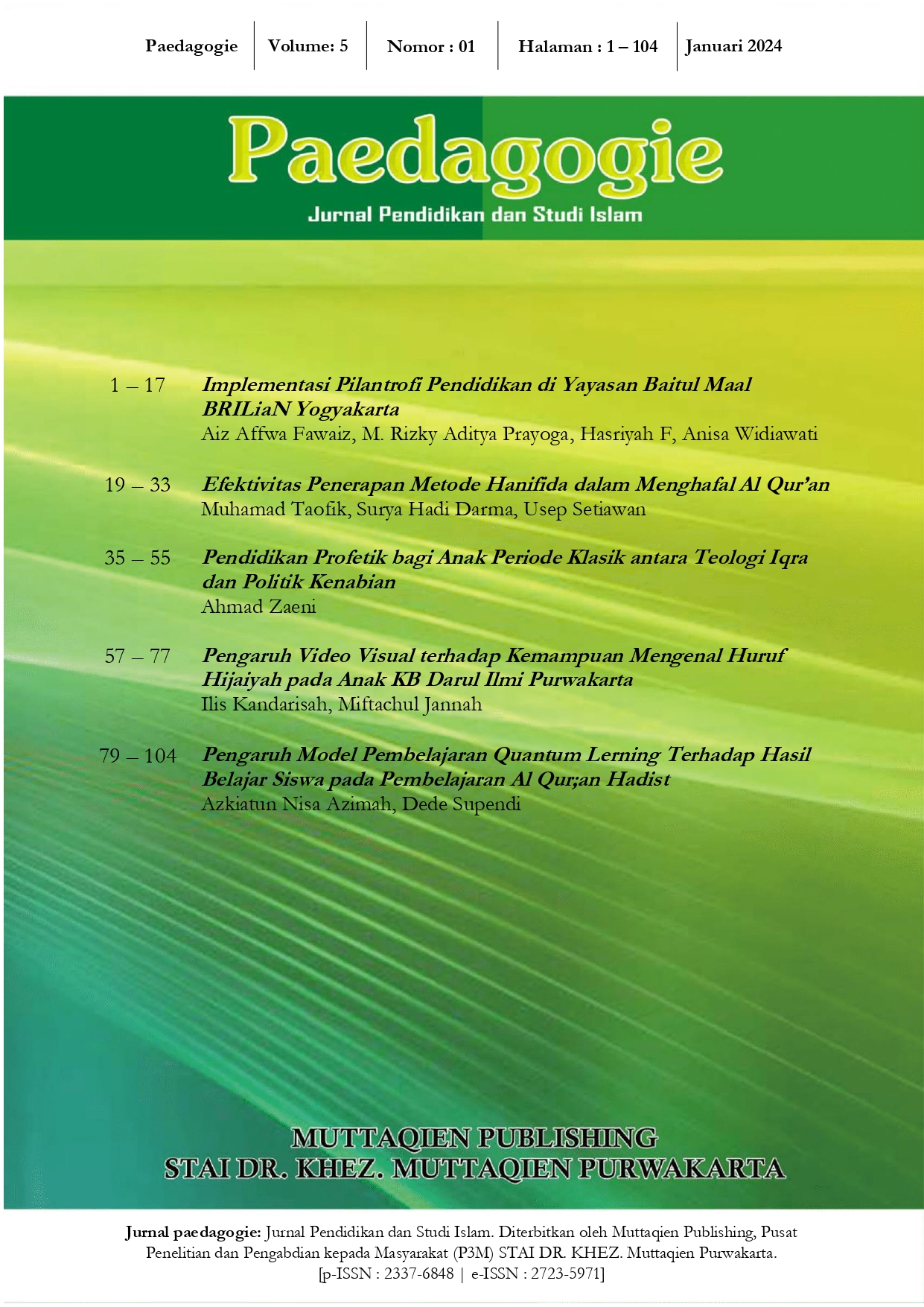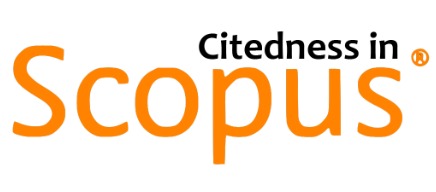IMPLEMENTATION OF EDUCATIONAL PHILANTHROPY AT THE BRILLIANT BAITUL MAAL FOUNDATION YOGYAKARTA
Abstract
Education is an important aspect in efforts to progress a nation, so in this case philanthropy has a role in pursuing education which often becomes a polemic in Indonesia to this day. The research results show that the Baitul Mal BRILiant Foundation is an institution that collects, manages and distributes zakat, infaq and alms funds from BRI employees throughout Indonesia which are divided into various regions, one of which is in the city of Yogyakarta. YBM BRILiant also focuses on implementing educational philanthropy activities, namely firstly My Scholarship which is a scholarship program intended for students from elementary school to tertiary level from mustahik families, secondly Smart Scholarship is a one year scholarship program and is intended for students High School (SMA) which is preparing for college level and the Bright Scholarship which is a three year scholarship program intended for students at state universities. So the orientation of the BRILian Foundation here is a form of their commitment to building vertical mobility and quality of life for poor families, as well as realizing the dreams of the nation's generations. This research uses a qualitative method with a descriptive approach. The research was conducted to gain a deeper understanding of the experiences, perceptions and views related to the YBM BRILianN program in implementing Educational Philanthropy.
Â
Keywords: Educational Philanthropy, YBM BRILLIANT, Entrepreneurship
References
Al-Mubarok, Fauzi, and Ahmad Buchori Muslim Buchori Muslim. “Kesalehan Sosial Melalui Pendidikan Filantropi Islam.†JIEBAR : Journal of Islamic Education: Basic and Applied Research 1, no. 1 (2020): 1–15. https://doi.org/10.33853/jiebar.v1i1.57.
Annisa, Nurul, Abdul Rahman Sakka, and Hadi Daeng Mapuna. “Tinjauan Hukum Islam Terhadap Program Peningkatan Keterampilan Usaha Rakyat (PKUR) Yayasan Baitu Maal.†Iqtishaduna: Jurnal Ilmiah Mahasiswa Jurusan Hukum Ekonomi Syariah 3, no. 4 (2022): 264–73. https://doi.org/https://doi.org/10.24252/iqtishaduna.vi.24718.
Billady, Azzam, and Anwar Subkiman. “Penerapan Lima Budaya Kerja BRI Pada Perancangan Interior Kantor Pusat Bank BRI.†REKAJIVA Jurnal Desain 1, no. 2 (2022): 88–97.
Certo, S. Trevis, and Toyah Miller. “Social Entrepreneurship: Key Issues and Concepts.†Business Horizons 51, no. 4 (2008): 267–71. https://doi.org/10.1016/j.bushor.2008.02.009.
Dimyati. “Pengentasan Kemiskinan Model Muhammad Yunus.†Irtifaq 1, no. 2 (2016): 78–97.
Futaqi, Sauqi, and Imam Machali. “Pembiayaan Pendidikan Berbasis Filantropi Islam: Strategi Rumah Pintar BAZNAS Piyungan Yogyakarta.†MANAGERIA: Jurnal Manajemen Pendidikan Islam 3, no. 2 (2019): 231–56. https://doi.org/10.14421/manageria.2018.32-02.
Hilwah, Fatimah. “Strategi Komunikasi Program Beasiswa Kader Surau Yayasan Baitul Maal (YBM) BRI Dalam Membentuk Muslim Intelek Pada Mahasiswa Institut Pertanian Bogor (IPB).†UIN Syarif Hidayatullah Jakarta, 2020.
Kholis, Nur, Soya Sobaya, Yuli Andriansyah, and Muhammad Iqbal. “Potret Filantropi Islam Di Propinsi Daerah Istimewa Yogyakarta.†La_Riba: Jurnal Ekonomi Islam 7, no. 1 (2013): 61–84. https://doi.org/10.20885/lariba.vol7.iss1.art5.
Latief, Hilman. “Filantropi Dan Pendidikan Islam Di Indonesia.†Jurnal Pendidikan Islam 28, no. 1 (2016): 123–29. https://doi.org/10.15575/jpi.v28i1.540.
Nasrullah, Aan. “Pengelolaan Dana Filantropi Untuk Pemberdayaan Pendidikan Anak Dhuafa (Studi Kasus Pada BMH Cabang Malang Jawa Timur) Aan.†Hunafa: Jurnal Studia Islamika 12, no. 1 (2015): 1–18. https://doi.org/https://doi.org/10.24239/jsi.v12i1.377.1-18.
Ningsih, Indah Wahyu, Ace Nurasa, Dandy Sobron M, Muhibbin Syah, and Mohamad Erihadiana. “Manajemen Pembiayaan Pendidikan Lembaga Filantropi Yatim Mandiri Dalam Pemberdayaan Mahasiswa Yatim (Study Analisis Program MEC).†JIIP - Jurnal Ilmiah Ilmu Pendidikan 4, no. 8 (2021): 859–69. https://doi.org/10.54371/jiip.v4i8.357.
Purwatiningsih, Aris Puji, and Hendri Hermawan Adinugraha. “Histori Filantropi: Tinjauan Teori Postmodern.†ZISWAF : Jurnal Zakat Dan Wakaf 5, no. 1 (2018): 149. https://doi.org/http://dx.doi.org/10.21043/ziswaf.v5i1.3573.
Rizky, Lucitania. “Bisnis Sosial: Sintesis Muhammad Yunus Untuk Menggerakkan Kapitalisme Di Bangladesh.†Jurnal Hubungan Internasional 4, no. 1 (2015): 23–34. https://doi.org/10.18196/hi.2015.0063.23-34.
Tenrinippi, A. “Kewirausahaan Sosial Di Indonesia ( Apa , Mengapa , Kapan , Siapa Dan Bagaimana ).†Meraja Journal 2, no. 3 (2019): 25–40.
Published
How to Cite
Issue
Section
Copyright (c) 2024 Aiz Affwa Fawaiz, M. Rizky Aditya Prayoga, Hasriyah F., Anisa Widiawati

This work is licensed under a Creative Commons Attribution-ShareAlike 4.0 International License.
Copyright and Licensing Policy
Paedagogie: Jurnal Pendidikan dan Studi Islam allows authors to retain the copyright of their work and to retain publishing rights. By submitting and publishing with this journal, authors agree to the following terms:
-
Copyright remains with the author(s), and they grant the journal the right of first publication. The work is published under a Creative Commons Attribution-ShareAlike 4.0 International License (CC BY-SA 4.0), which permits use, distribution, and reproduction in any medium, provided the original work is properly cited and any derivative works are distributed under the same license.
-
Authors are allowed to enter into additional non-exclusive distribution agreements (e.g., posting to institutional repositories, publishing in books), with acknowledgment of the work's initial publication in this journal.
-
Authors are encouraged to disseminate their work online (e.g., in repositories or on personal websites) before and during the submission process to increase visibility and impact.
Paedagogie: Jurnal Pendidikan dan Studi Islam supports open access and affirms that libre access with a CC BY-SA license or its equivalent is the optimal approach for scholarly communication. We prioritize free and open dissemination while encouraging the reuse and adaptation of published content under fair and equitable terms.
You are free to:
- Share — copy and redistribute the material in any medium or format
- Adapt — remix, transform, and build upon the material for any purpose, even commercially.
- The licensor cannot revoke these freedoms as long as you follow the license terms.















